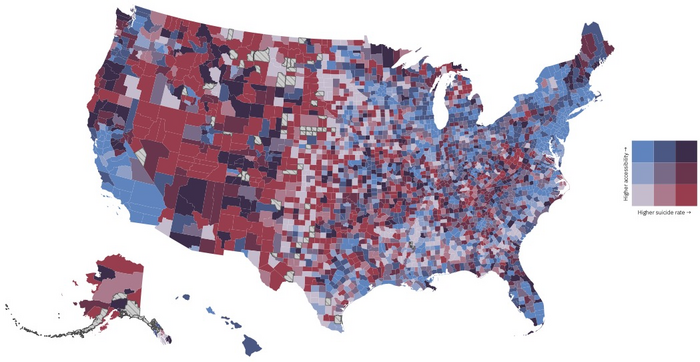Amid historically high suicide rates and mental health care provider shortages, new research from Incite @ Columbia University suggests that interventions to alleviate mental health care access disparities can prevent unnecessary death and suffering. In an article pending publication in PNAS next week, “Differential Spatial-Social Accessiblity to Mental Health Care and Suicide,” Daniel Tadmon and Peter S. Bearman find that in the United States improved access to mental health care is associated with reductions in suicide risk.

Credit: Daniel Tadmon and Peter S. Bearman
Amid historically high suicide rates and mental health care provider shortages, new research from Incite @ Columbia University suggests that interventions to alleviate mental health care access disparities can prevent unnecessary death and suffering. In an article pending publication in PNAS next week, “Differential Spatial-Social Accessiblity to Mental Health Care and Suicide,” Daniel Tadmon and Peter S. Bearman find that in the United States improved access to mental health care is associated with reductions in suicide risk.
To enable this research, Tadmon and Bearman developed new methods of measuring access with greater granularity than previously possible. To start, they precisely located all psychiatrists and therapists in the United States, creating a comprehensive, accurate provider mapping for the first time. For each census tract, roughly equivalent to a neighborhood in size, they calculated residents’ access to care by incorporating service demand, competition, and transportation options. Next, they compared this score to the average suicide rate at the county level. Higher scores, which indicated shorter travel times to more providers who are less saturated by demand, were strongly associated with reduced suicide risk. This effect persisted when controlling for other key factors associated with suicide, including race, divorce, and gun shop prevalence.
This work illuminates misalignments between health care distribution and need in the United States. Tadmon notes that this data also exposes the high level of inequality in access to care. He adds, “It’s alarming that the same people whose social circumstances put them at greater risk for suicide also have a much harder time finding available psychiatrists and therapists who could help them.”
For more information on the dataset underpinning this work, visit Incite’s website.
About Incite @ Columbia University
Incite is a leading interdisciplinary social science research institute at Columbia University. Incite’s mission is to create knowledge for public action—to catalyze conversations that lead to more just, equitable, and democratic societies.
Journal
Proceedings of the National Academy of Sciences
DOI
10.1073/pnas.2301304120
Method of Research
Meta-analysis
Article Title
Differential Spatial-Social Accessiblity to Mental Health Care and Suicide
Article Publication Date
1-May-2023




